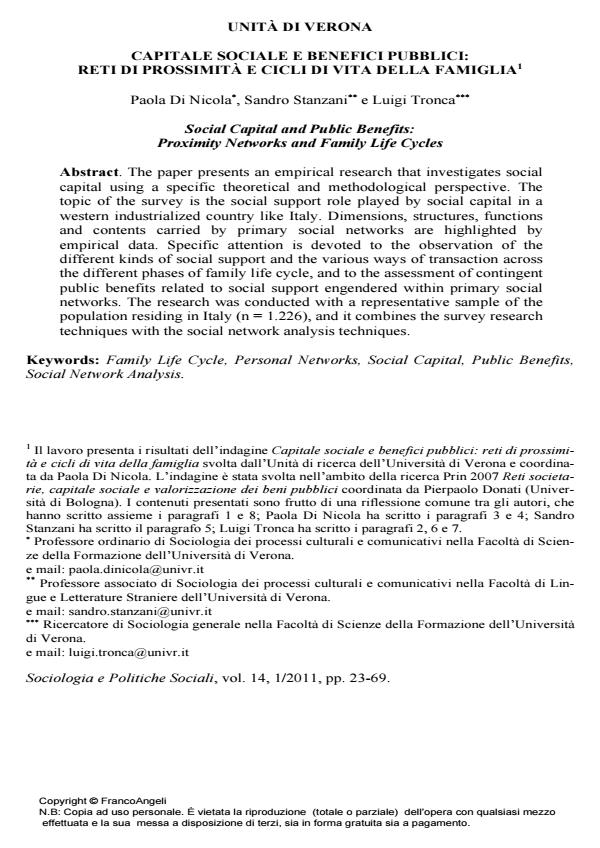Capitale sociale e benefici pubblici: reti di prossimità e cicli di vita della famiglia
Titolo Rivista SOCIOLOGIA E POLITICHE SOCIALI
Autori/Curatori Paola Di Nicola, Sandro Stanzani, Luigi Tronca
Anno di pubblicazione 2011 Fascicolo 2011/1
Lingua Italiano Numero pagine 47 P. 23-69 Dimensione file 614 KB
DOI 10.3280/SP2011-001003
Il DOI è il codice a barre della proprietà intellettuale: per saperne di più
clicca qui
Qui sotto puoi vedere in anteprima la prima pagina di questo articolo.
Se questo articolo ti interessa, lo puoi acquistare (e scaricare in formato pdf) seguendo le facili indicazioni per acquistare il download credit. Acquista Download Credits per scaricare questo Articolo in formato PDF

FrancoAngeli è membro della Publishers International Linking Association, Inc (PILA), associazione indipendente e non profit per facilitare (attraverso i servizi tecnologici implementati da CrossRef.org) l’accesso degli studiosi ai contenuti digitali nelle pubblicazioni professionali e scientifiche.
The paper presents an empirical research that investigates social capital using a specific theoretical and methodological perspective. The topic of the survey is the social support role played by social capital in a western industrialized country like Italy. Dimensions, structures, functions and contents carried by primary social networks are highlighted by empirical data. Specific attention is devoted to the observation of the different kinds of social support and the various ways of transaction across the different phases of family life cycle, and to the assessment of contingent public benefits related to social support engendered within primary social networks. The research was conducted with a representative sample of the population residing in Italy (n = 1.226), and it combines the survey research techniques with the social network analysis techniques.
Parole chiave:Family Life Cycle, Personal Networks, Social Capital, Public Benefits, Social Network Analysis
- Family Social Capital’s Impact on the Family Stress Model: A Cross-Sectional Spanish Study During the COVID-19 Pandemic Rita Cavallotti, Laia Pi Ferrer, Rejina M. Selvam, in Journal of Comparative Family Studies /2024 pp.232
DOI: 10.3138/jcfs-096-2022 - L'analisi delle semantiche fondamentali della relazione sociale attraverso. La social network analysis Luigi Tronca, in SOCIOLOGIA E POLITICHE SOCIALI 1/2017 pp.9
DOI: 10.3280/SP2017-001002
Paola Di Nicola, Sandro Stanzani, Luigi Tronca, Capitale sociale e benefici pubblici: reti di prossimità e cicli di vita della famiglia in "SOCIOLOGIA E POLITICHE SOCIALI" 1/2011, pp 23-69, DOI: 10.3280/SP2011-001003